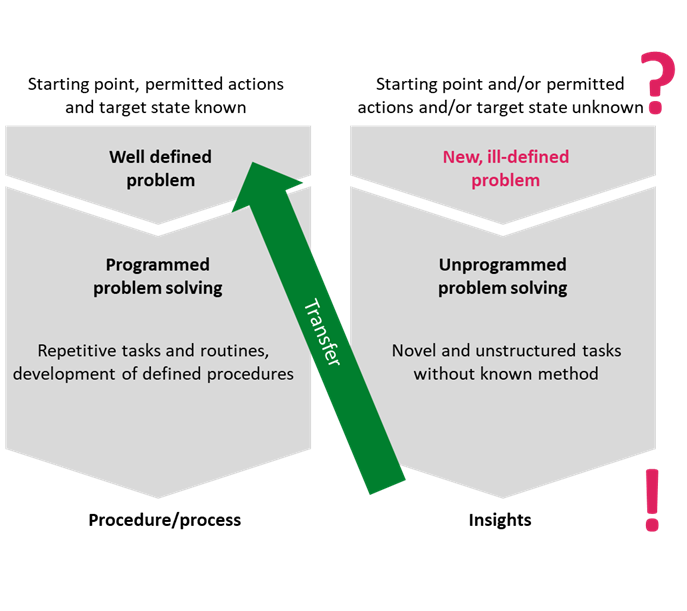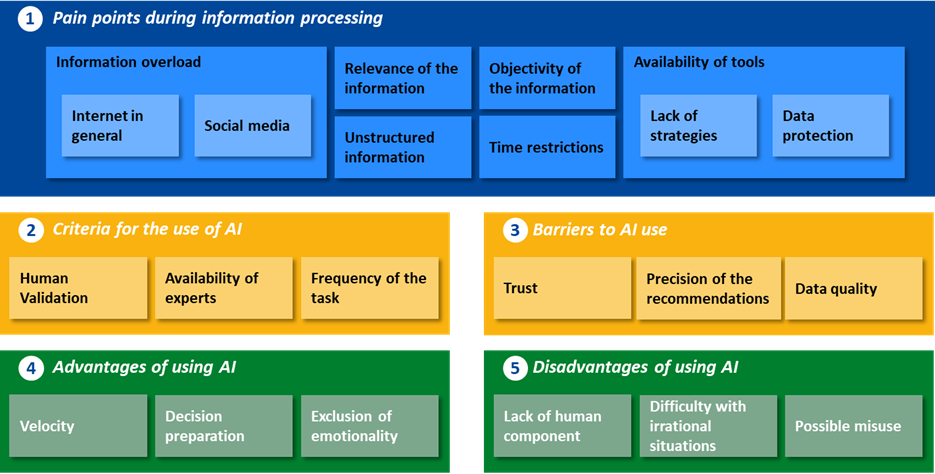
Managers and Artificial Intelligence in the Age of Information Overflow
The discussion on the use of artificial intelligence (AI) often revolves around the optimization of processes or the recognition of patterns in huge amounts of data. While the optimization of processes is based on the monetary rationale of increased efficiency, the second much-discussed area of application addresses a very human problem: Our brain is by far the most efficient computer, but neither processing speed nor storage capacity can be expanded at present. But in a world where the amount of digital data generated annually is predicted to increase from 45 zettabytes in 2019 to 175 zettabytes in 2025, we humans will most likely very soon reach our limits with our brain power (IDC, 2020). Remember: one zettabyte equals 1,000,000,000,000,000 megabytes – if I remember correctly, my first MP3 player had a storage volume of 64 megabytes. In the future, our brain will therefore have to process, classify and prioritize even more digital information than it already does today, both in our private environment (social media) and at work (e-mail).
In contrast to my then state-of-the-art MP3 player, the “smart devices” and “smart services” of our time provide us with all kinds of real-time information. As a result, smart phones and the like are in competition with our attention in the real world. Notice how often a WhatsApp message interrupts a conversation – even if the person you are talking to doesn’t read it immediately, but only sees the notification on the screen. Whether we like it or not, all those notifications are picked up by our brains, processed, and thus rob us of our concentration on what is important.Anyone who has thought that Elon Musk’s idea of the brain-computer interface “Neuralink” to expand information processing is just a marketing move or simply an AI dystopia will certainly at least be puzzled by a glance at the usage statistics of their own smartphone. For the foreseeable future, the question will arise as to how we as humans can a) process the masses of incoming information, b) how we can remain mentally healthy despite all the information overload, and c) how we should counteract AI algorithms if they provide us with fake information that cannot be distinguished from reality.

Managers – the data center of every company
Granted, the title of this section is technically controversial. But have you ever seriously thought about what a manager does day in and day out? First and foremost, he or she solves novel, ill-defined problems – the kind of problems where the starting point, target state or even the actions to achieve the target state are unknown. Scientifically speaking, a manager solves such problems by means of “unprogrammed problem solving”. This means that there is no known procedure for the problem and the manager has to develop such a procedure on his own. And how does a manager develop such a new approach? Correct, he or she obtains as much information as necessary to better describe the problem and to develop a procedure to solve it. In most cases, a manager does not only work on one such problem per week, but several problems per day with varying degrees of granularity. And this brings us back to the managers in their role as the company’s data center, because the amount of information available is increasing in parallel with the complexity of the problems caused by digitalization, globalization, etc. Ultimately, managers transfer the findings of the solution process or even the procedure itself into the process and/or organizational structure. Thus, poorly defined problems are transformed into well defined problems, which in turn can be solved repetitively and routinely.
Pain points of managers in information processing and the future role of artificial intelligence
The analysis of three focus group interviews with our CC Ecosystem partners shows that managers feel overburdened by the variety of available information from the Internet and social media, especially LinkedIn and the like in the professional context. According to managers, it is becoming increasingly difficult to classify the relevance of information and to check its objectivity. These challenges are closely linked to poorly structured data: Since managers often have to solve problems that have not existed before, information from analyses or other media can usually only address the problem in question superficially. In order to provide managers with better structured information, organizations not only lack suitable tools, but also strategies to relieve managers. This is where the real dilemma of the information age becomes apparent: if organizations do not understand the increasing flood of information with which their management will be confronted in the future, there is a risk of a decreasing quality of decision-making – with negative consequences for the entire company. Because if the management level cannot generate high-quality insights into new types of problems, the procedures and processes derived from them will not bring long-term added value to the company. Thus, the information overload in combination with the natural cognitive restrictions of managers could endanger the long-term success of companies. In addition, organizational data protection regulations also hinder the widespread use of AI systems.
According to the participants, the advantages of using AI-based tools for management tasks are the speed with which decisions can be prepared and the exclusion of emotionality during information processing. Interestingly, however, managers want the results of an AI-based tool to continue to be validated by a human being. Furthermore, they would prefer to use AI tools for repetitive tasks and favor human experts for more complex tasks when available. In general, managers feel that the missing human component is a loss. In addition, AI tools may have difficulty in dealing with irrational situations and may be misused against users. Irrational situations are events that an AI system cannot interpret, e.g. because it has not been trained to recognize these situations. Although online translators are getting better and better, due to the complexity of human language, there are always cases where an AI is not able to provide an understandable translation because, for example, the source text contains an error that would not be a problem for a human. These gaps in the configuration are of course not intentional, but often occur for the simple reason that humans know a great deal, but can only put a fraction of their knowledge into words. This phenomenon is called the Polanyi paradox. We cannot translate the unconscious part of our knowledge into requirements for an AI system, which results in irrational situations for the AI system. The misuse of an AI system for managers could, for example, be such that false information is deliberately fed into certain media, which in turn is analyzed by the AI system and thus finds its way into management decision-making. Another key barrier to the use of AI tools by managers is trust in the systems, and the precision of the recommendations made by the systems would have to be very high. However, according to the CC partners, one of the highest barriers is data quality, which is usually not sufficient to provide high-quality AI tools.

Leadership in the age of artificial intelligence
It is certainly not advisable to immediately implant a brain-computer interface in all managers. However, managers already feel overloaded by the mass of information and do not see this aspect sufficiently taken into account in their organizations – the results of the focus group interviews have shown this. A company is only successful if decisions can be made on a sound basis. Managers in particular are expected to find meaningful answers to new problems on a daily basis. However, a good quality of decision making necessarily requires the analysis of a large amount of information. Especially in view of the growing amount of digital data, AI-based tools should be made available to managers so that they can continue to make good decisions for the future success of the company. A good example of a transparent and easy-to-understand AI system for decision support is “Sentifi Intelligence”, one of the winners of our Finance-IT Innovation Award 2019: Sentifi supports investors in information processing and ultimately decision making by analyzing news, blog posts or tweets from e.g. portfolio managers or activists and evaluating their opinion on specific companies. These opinions are linked to certain events, such as planned company takeovers, so that an investment manager, for example, can obtain a comprehensive picture of the company beyond financial figures. The opinions are bundled in a recommendation on the respective company, but the decision-maker can always see how the recommendation is composed, who has shaped it and which events have significantly influenced the opinions.
The sheer impact of the decisions made by managers in companies justifies a strategic examination of how managers can be better supported in their tasks. In the age of information overload, it is important for managers to maintain an overview, otherwise the sustainable existence of many companies is at risk. Therefore, it is especially important that managers can understand how supporting AI systems work – otherwise they face the risk of manipulation and abuse. After all, Shakespeare rightly asked: “What is the body when the head is off?”.
References
IDC, 2020. The Digitization of the World From Edge to Core. URL: https://www.seagate.com/files/www-content/our-story/trends/files/dataage-idc-report-final.pdf
